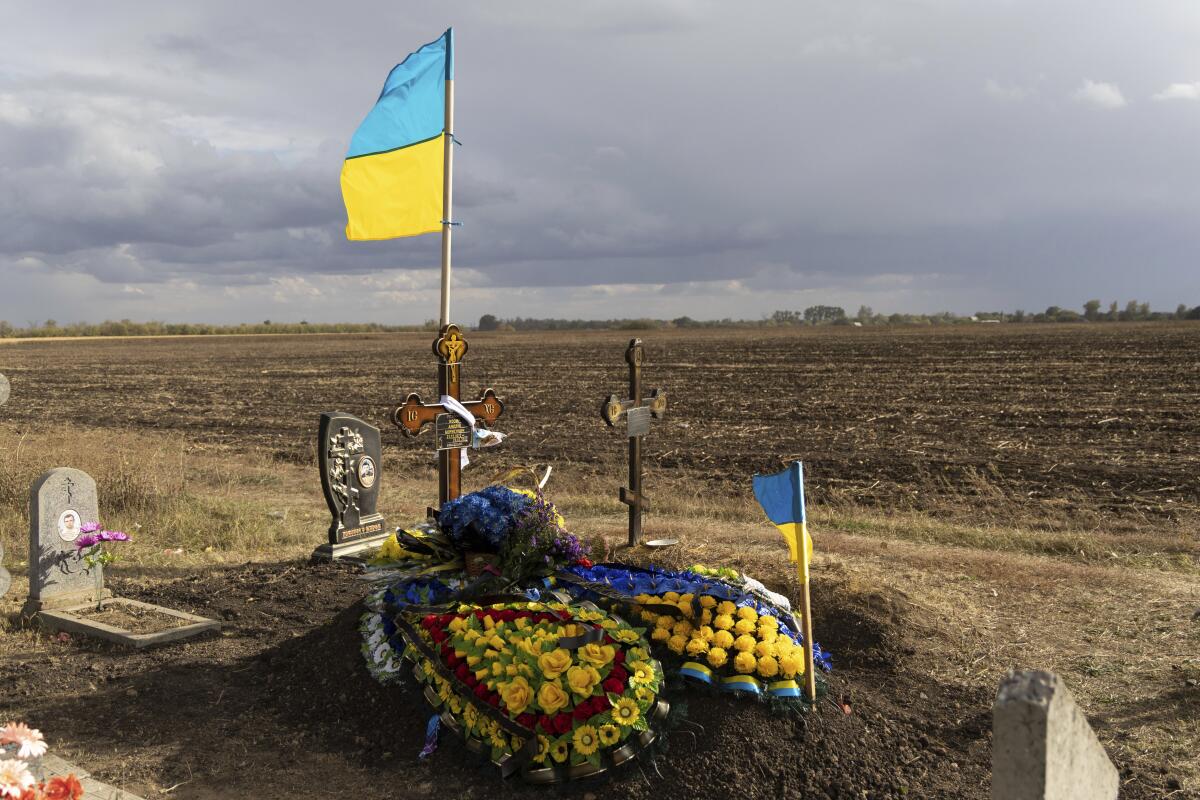Column: Israel and Ukraine? Americans should remember it’s the same war on two fronts

- Share via
In normal times domestic political fights over foreign policy break down more or less along a conventional left-right divide. These are not normal times.
The right is largely united around the need to support Israel in its war with Hamas, but increasingly divided about backing Ukraine in its war with Russia. The left is largely united around the need to help Ukraine, but more divided about siding with Israel.
There’s something deeply troubling about the discussion over Israel’s failure to prevent the attacks. It assumes the terrorists have no agency in choosing not to engage in barbarity.
It’s not perfectly symmetrical. Democrats are more unified on Israel, in part because of President Biden’s unequivocal support. But it’s early. After all, the history of the Democratic Party resisting campus radicals and the “antiwar” left is not a tale of heroic resolve. And that the response on campuses to a terrorist pogrom was to immediately express support for Palestinians does not suggest the left-wing fringe will come around to a more nuanced stance.
Meanwhile, even though the GOP is unified in its support for Israel — to the point where even many America-firsters have abandoned all foreign policy consistency to show solidarity with Israel — on the fringes, especially on social media, skepticism over support for Israel is already growing.
After the attack in Israel, my Facebook feed filled with funeral announcements and pleas for information. But I also see friends frame it as anti-colonial resistance.
In some of the swampier quarters, outright antisemitism is breaking into the open. And Donald Trump, who has long boasted of doing more for Israel than anyone since Moses, is suddenly celebrating how “very smart” Hezbollah is and berating Israeli Prime Minister Benjamin Netanyahu (which is not to say he doesn’t deserve criticism, though not from Trump).
Given the hothouse of a presidential election, it doesn’t seem far-fetched to imagine support for Israel melting away on the new right and the “anti-Zionist” left as Biden becomes more identified with support for Israel.
In short, inside the water’s edge of domestic politics, it’s a two-front war. What I think a lot of people are missing is that it’s a two-front war outside the water’s edge too.
Will reducing Gaza to rubble actually achieve long-term security for Israel? Are there no other, more effective ways to neutralize Hamas that Israel hasn’t yet tried?
There’s been an intense and bizarre debate over Iran’s complicity in Hamas’ attack. Iran has supported Hamas for decades. Whether it officially ordered, or approved, the invasion beforehand hardly erases its culpability. If you keep assassins who vow to kill Israelis on a retainer, it’s hardly an outrageous slander to say you have some responsibility when they do.
The more vital question is of Russia’s involvement. Russia’s disastrous war on Ukraine has drawn it ever closer to Iran, which supplies it with drones and other weapons. Both of these heavily sanctioned pariah-states depend on oil revenue to stay afloat. Global instability keeps the petrodollars flowing. There’s no evidence that Russia greenlighted the attack, but it’s clear that Putin benefits from a Middle East war that diverts Western attention and resources.
Why give him the win he wants?
Squabbling with critics, blaming the media, stacking the courts — it’s no way to run a country, whether in Israel or the U.S. And it’s a distraction from real threats.
Ukraine, which has expressed its support for Israel, certainly sees the stakes clearly. President Volodymyr Zelensky even wants to visit Israel as a show of solidarity.
Opponents of aiding Ukraine dismiss any linkage — legislatively, strategically or morally — between Israel and Ukraine. Forty-eight hours after the Hamas attack, Sen. Josh Hawley (R-Mo.) insisted: “Israel is facing existential threat. Any funding for Ukraine should be redirected to Israel immediately.” The populist Heritage Foundation declared: “Lawmakers need to resist attempts to link emergency military support for Israel with additional funding for Ukraine. These conflicts are separate and distinct.”
Not really.
Seeing both conflicts through a partisan lens just demonstrates how domestic partisanship can blind you to the bigger picture. These are two fronts in broadly the same fight. Israel and Ukraine alike are flawed but decent democracies facing enemies who seek to erase them from the map. Israel may be more of a historic ally than Ukraine, but their enemies are allies with shared interests.
Putting all other obvious moral and strategic considerations aside, America simply has a vital interest in maintaining its credibility to keep its commitments not just to Ukraine and Israel, but to our broader coalition of allies.
After 9/11, the North Atlantic Treaty Organization got our back. Now NATO needs us to help deal with the threat on its doorstep. And we may need NATO if Iran opts to join the fray in Israel. Lord knows China is watching to see if we buckle.
None of this requires American boots on the ground in Israel or Ukraine. Both countries are willing to do the fighting and dying. What they want is help in what amounts to the same war on two fronts.
More to Read
A cure for the common opinion
Get thought-provoking perspectives with our weekly newsletter.
You may occasionally receive promotional content from the Los Angeles Times.















